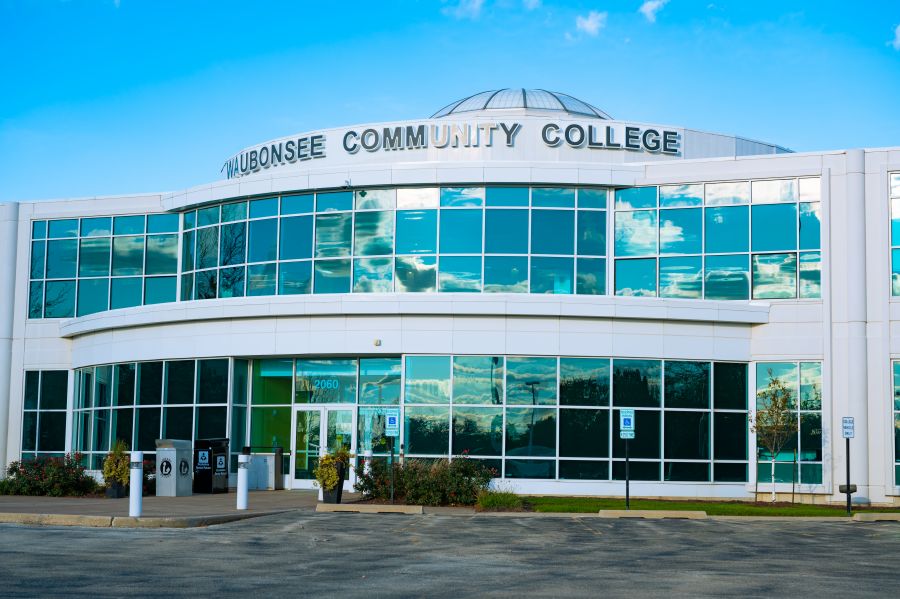


Waubonsee Community College recognized the ACEN accredited Nursing Program at its May board meeting for providing 50 years of excellence in nursing education. Together with numerous community health partners, the college celebrates the outstanding learning experiences it has created for more than 2,800 nursing alumni.
“The celebration of our Nursing Program’s 50th anniversary represents the history of alumni who have made a significant impact in healthcare across the district,” said Suzette Murray, Assistant Vice President of Education and Workforce Development.
Since Waubonsee’s Nursing Program first started in 1972, it has earned a reputation for providing the most diverse pre-licensed nurses for hospitals and healthcare facilities in the greater Fox Valley area. The program creates a pipeline of culturally competent nurses, graduating 28% of nurses who identify as Latinx or Hispanic, 5% of those who identify as Black or African American, and 3% who identify as Asian American.
Embracing diversity in the class gives Waubonsee nurses a greater chance to learn and appreciate the type of cultural diversity they will encounter once they enter the workforce.
According to Dr. Marjie Schoolfield, Associate Professor of Nursing and Associate Degree Nursing Program Director, it is estimated that for every 100 nursing students who go into the workforce after completing a program, 60,000 lives are touched annually. Upon graduation, Dr. Schoolfield believes that Waubonsee nursing students are more prepared than the average nurse because they receive 670 hours of instructional learning, which is more face-to-face instruction in labs and clinical than the average nursing program provides.
Waubonsee’s Nursing Program stands out for its small cohort and the rotating clinical model. Students advance through the program with the same classmates for two full years. Students enjoy consistency by building personal connections with both full-time and adjunct faculty who have, on average, eight to ten years of service. Being in a small, sequenced cohort, students continually build, learn, and master material in hands-on clinical experiences to carry them to the next course.
From the first nursing class, students are given as many opportunities as possible to experience a clinical setting with different partners to experience the vast array of opportunities available in the nursing field. The clinical exposes nursing students to all age levels of patients in a variety of long-term and mental health facilities, nursing homes, and surrounding hospitals, including Northwestern Medicine Kishwaukee Hospital in DeKalb, Northwestern Medicine Valley West Hospital in Sandwich, Northwestern Medicine Delnor Hospital in Geneva, Rush Copley Medical Center in Aurora, and AMITA Health Mercy Medical Center in Aurora. At the end of each clinical, one faculty member concludes with a reflective exercise called “Commit to Sit,” which invites each student to share a key takeaway or component they learned. They are encouraged to sit in the room with the patient and get to know them personally.

“Giving new nursing students this type of early exposure helps faculty reframe what they are teaching students,” said Nora Silvia, Assistant Dean for Health Professions and Public Service. “The students come back eager and excited to be in the classroom with different experiences and share their knowledge with the cohort.”
At the Aurora Fox Valley Campus, nursing students learn to apply clinical judgment and critical thinking to their patients in the simulation lab. Additionally, students use high-fidelity mannequins to practice giving shots, starting an IV, or obtaining a blood return. Students learn how to adapt to different settings and, in some cases, adapt skills according to their constituents or the different policies at partner locations.
During the pandemic, students from Waubonsee’s Nursing Program participated in administering the COVID-19 vaccine to the community in partnership with the Kane County Health Department. "It gave them valuable experience to not only give the vaccine and but help educate the public about the vaccine,” said Dr. Schoolfield.
The faculty continually modify their approach to teaching and classroom learning based on the feedback they receive from the Waubonsee Nursing Program Advisory Board. Members of this board are practicing health care professionals who share best practices and trends they see in nursing. Although they do not set academic policy, their feedback helps faculty to incorporate the usage of the latest technology and nursing procedures into the classroom. The faculty also bring case studies shared by this group into simulation lab activities. Fifty percent of the full-time faculty are former Waubonsee nursing students and some continue to work in some aspect of nursing.
More than 90% of Waubonsee nursing students reported they plan to begin a bachelor’s degree in nursing within one year or less after graduating from Waubonsee. This tells a compelling story that Waubonsee nursing students are prepared for their field and recognize the need for lifelong learning in the field of healthcare.
Waubonsee offers an affordable and accredited associate degree in nursing and a transfer pathway for those seeking direct entrance into a bachelor’s degree in nursing. Students advance in skilled nursing and can enter the workforce quickly with the experience they receive at Waubonsee. Learn more about Waubonsee’s Nursing Program at waubonsee.edu/nursing.

